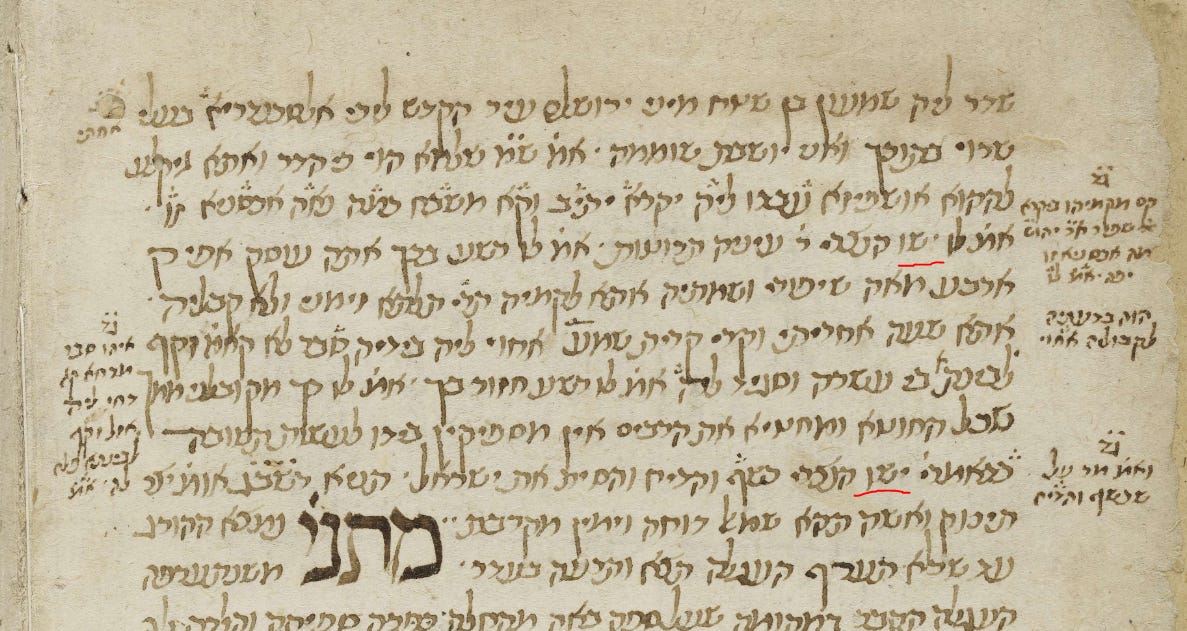Xena, Warrior Innkeeperess?
Deadlines looming, so just some quick thoughts on Sotah 47.
Why no forest and no bears? Reading the pesukim in context, this seems to come out of nowhere. Suddenly bears? And people don’t associate cities, even roads outside cities, with forests. Often, the Biblical style is to lay out the setting, so that there are no surprises later. Oh, by the way, Yosef would graze the sheep with his brothers. Or else, as an afterthought, oh yes, Yonah had informed the sailors about this.
There’s also perhaps a rationalist / mystic divergence within Rav and Shmuel. Rationalists want there miracles to work somewhat within derech hateva, so there would need to be a forest. Though even the one saying there was a forest doesn’t say that there were indeed bears in the forest, just the timing was such that they came out.
I don’t think this is the case, because it doesn’t work well on a peshat level, but while the verse doesn’t previously mention a יער, it does indeed mention an עיר. This would be metathesis, the transposition of two letters. But bears wouldn’t come from a city, unless that city was Chicago. Perhaps let the youths emerge from the forest, rather than from the city?
We should feel uncomfortable that such punishment devolves upon young lads, despite being rude to the navi. I think part of Chazal’s reading is that there was more to this than mere rudeness. The idea that levaya was necessary, or else this wouldn’t have happened, and connecting it to eglah arufah seems strange, because Elisha wasn’t the victim! Unless you say that he almost was the victim, had he not had navi superpowers. Forty-two youths mocking him, saying “come up baldy”, but mocking may have been the start of the intended incident, and it would have progressed to roughing him up, stealing his money, and murdering him. Or maybe not. But there are other statements about their nature. Read them in that light.
To run with Rav Yosef’s point, but taking it in a different direction than the gemara does, consider that naarah ketanah was also within the set of Elisha stories, so maybe nearim ketanim simply means yoots. And so to by naarah ketanah, a female yoot.In the story of Rabbi Yehoshua ben Perachya’s student, I heard Rabbi Aryeh Lebowitz explain it as Rabbi Yehoshua praising the innkeeperess for her good deeds, and the student (perhaps Jesus) taking it as praising her for her beauty, at which point he said she was not so pretty. And so Rashi, and so Artscroll.
Rav Steinsaltz didn’t seem to translate it in his Hebrew commentary, but I think the English translation got it right:
כִּי אֲתָא, אִקְּלַע לְהָהוּא אוּשְׁפִּיזָא, קָם קַמַּיְיהוּ בִּיקָרָא שַׁפִּיר, עָבְדִי לֵיהּ יְקָרָא טוּבָא, יָתֵיב וְקָא מִשְׁתַּבַּח: כַּמָּה נָאָה אַכְסַנְיָא זוֹ! אֲמַר לֵיהּ יֵשׁוּ הַנּוֹצְרִי: רַבִּי, עֵינֶיהָ טְרוּטוֹת. אֲמַר לֵיהּ: רָשָׁע, בְּכָךְ אַתָּה עוֹסֵק? אַפֵּיק אַרְבַּע מְאָה שִׁפּוּרֵי וְשַׁמְּתֵיהּ. כׇּל יוֹמָא אֲתָא לְקַמֵּיהּ וְלָא קַבְּלֵיהּ.When he came back to Eretz Yisrael, Rabbi Yehoshua arrived at a certain inn. The innkeeper stood before him, honoring him considerably, and overall they accorded him great honor. Rabbi Yehoshua ben Peraḥya then sat and was praising them by saying: How beautiful is this inn. Jesus the Nazarene, one of his students, said to him: My teacher, but the eyes of the innkeeper’s wife are narrow [terutot]. Rabbi Yehoshua ben Peraḥya said to him: Wicked one, is this what you are engaged in, gazing at women? He brought out four hundred shofarot and excommunicated him. Every day Jesus would come before him, but he would not accept his wish to return.
Even though they use ushpiza for inn and achsanya can indicate innkeeper, it also means lodging / inn. Xenia = inn or innkeeper.Jesus simply misunderstood him. And the idea is, is your mind in the gutter, that you are interpreting the ambiguous statement so?
Finally, it is perhaps unclear whether Yeshu HaNotzri makes an appearance in this sugya, and even if so, whether that would accord with the Christian Jesus. But there is certainly censorship happening here, where reference to Yeshu is taken out.
All manuscripts, and even the Venice printing, had שדחפו לישו הנוצרי. Vilna suddenly has שדחפו לאחד מתלמידיו.
Thus, Vatican 110:
Meanwhile, below, when it comes to the actual story, rather than Rabbi Yehoshua pushing him away, even many manuscripts omit one or both references. It becomes “him” instead. Only Oxford 2675 has in both the observation about the inn(keeper) and the sorcery.








